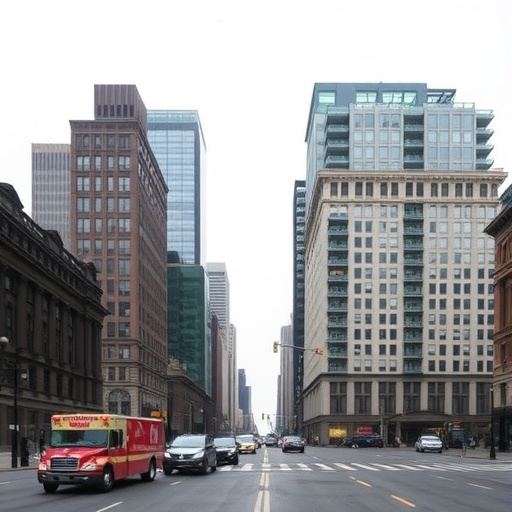Chicago Sues Trump Administration Over Restrictive Emergency Relief Funding Rules
In a bold escalation of tensions between local governments and federal authorities, the City of Chicago has filed a lawsuit against the Trump administration, accusing it of imposing unlawful restrictions on emergency relief funding. The suit, lodged in federal court on Monday, challenges executive orders that critics say hamstring cities’ ability to respond swiftly to disasters, potentially leaving urban centers like Chicago vulnerable during crises. This legal battle highlights growing friction over how billions in federal aid are distributed amid ongoing national emergencies.
- Chicago’s Lawsuit Targets New Federal Barriers to Disaster Aid
- Trump Administration’s Emergency Relief Overhaul Sparks Nationwide Backlash
- Local Impacts: How Funding Restrictions Hit Chicago’s Front Lines
- Expert Voices and Legal Precedents in Chicago’s Funding Fight
- Outlook: Court Battles and Potential Shifts in Federal-Local Aid Dynamics
Chicago’s Lawsuit Targets New Federal Barriers to Disaster Aid
The lawsuit stems from recent Trump administration directives that limit the flexibility of emergency relief funding, requiring stricter compliance with federal priorities before cities can access funds. Chicago officials argue these rules violate the Stafford Act, the primary federal law governing disaster assistance, by adding bureaucratic hurdles that delay aid delivery. The city is seeking an injunction to block the restrictions, claiming they could jeopardize public safety in a metropolis prone to severe weather events and infrastructure challenges.
According to court documents, the restrictions were outlined in a March executive order aimed at ensuring funds align with national security interests, but Chicago contends this overreach discriminates against sanctuary cities like itself. ‘These policies aren’t just red tape; they’re a direct threat to our residents’ lives,’ said Chicago Mayor Lori Lightfoot in a press conference announcing the suit. The mayor emphasized that Chicago has relied on flexible emergency relief funding for responses to events like the 2019 polar vortex and recent flooding along the Chicago River.
Legal experts note that this isn’t the first time Chicago has clashed with the Trump administration over funding. In 2017, the city successfully challenged attempts to withhold grants due to its immigration policies. This latest lawsuit, filed by the city’s Corporation Counsel, demands immediate access to approximately $150 million in withheld funds earmarked for urban resilience projects. The complaint details how the new rules require pre-approval for 70% of expenditures, up from previous thresholds, slowing response times by weeks in critical situations.
Trump Administration’s Emergency Relief Overhaul Sparks Nationwide Backlash
The Trump administration defends the restrictions as necessary safeguards against waste and misalignment with federal goals. White House spokesperson Kayleigh McEnany stated during a briefing, ‘President Trump is committed to ensuring emergency relief funding protects all Americans, not just select cities with agendas that conflict with national policy.’ The overhaul, part of a broader review of FEMA’s allocation processes, was prompted by audits revealing inefficiencies in past distributions totaling over $50 billion annually.
Under the new guidelines, cities must submit detailed plans demonstrating how funds support ‘America First’ initiatives, including border security enhancements and infrastructure tied to federal trade priorities. For Chicago, this means justifying aid for local projects like flood barriers in terms that align with distant national objectives, a process officials describe as convoluted and politically motivated. Data from the U.S. Conference of Mayors indicates that similar restrictions have already delayed aid to at least 15 major cities since implementation, with Chicago facing the most significant shortfall at $200 million in potential losses over the next fiscal year.
Critics, including Democratic lawmakers, have decried the move as punitive toward blue-leaning urban areas. Illinois Senator Tammy Duckworth, co-sponsoring a bill to repeal the restrictions, remarked, ‘This isn’t about efficiency; it’s about punishing cities that don’t toe the administration’s line on immigration and other issues.’ The lawsuit cites specific instances where Chicago’s emergency responses were hampered, such as a 2020 heatwave that strained resources without immediate federal support due to pending approvals.
Local Impacts: How Funding Restrictions Hit Chicago’s Front Lines
On the ground in Chicago, the restrictions are already making waves. Emergency management teams report increased strain on city budgets, forcing reallocations from other services. For instance, the Chicago Fire Department, which handles urban search and rescue, has had to dip into general funds to cover overtime during recent storms, as federal reimbursements remain stalled. ‘We’re talking about real lives here—delays in funding mean delays in sandbagging, evacuations, and recovery,’ explained Fire Commissioner Jose Santiago in an interview.
Statistics underscore the urgency: Chicago experiences an average of 20 severe weather events annually, from blizzards to tornadoes, affecting over 2.7 million residents. The city’s 2021 emergency preparedness report estimates that unrestricted access to federal funding could save up to $300 million in local expenditures per major incident. Without it, neighborhoods like those on the South Side, already grappling with aging infrastructure, face heightened risks. Community leaders from affected areas have rallied in support of the lawsuit, organizing forums to highlight stories of families displaced by floods without timely aid.
Economically, the ripple effects are profound. A study by the University of Chicago’s Harris School of Public Policy projects that prolonged funding disputes could cost the city 5,000 jobs in construction and recovery sectors over the next two years. Small businesses in flood-prone zones, such as those along Lake Michigan, are particularly vulnerable, with many unable to secure low-interest loans tied to federal relief programs due to the holdups.
Expert Voices and Legal Precedents in Chicago’s Funding Fight
Legal scholars are closely watching the case, drawing parallels to past victories against federal overreach. Professor Amanda Frost from the American University Washington College of Law pointed out that courts have repeatedly struck down similar funding conditions, as seen in the 2018 ruling against sanctuary city defunding. ‘Chicago has a strong case under the Tenth Amendment, which reserves disaster response powers to states and localities,’ Frost said. The lawsuit invokes this precedent, arguing the Trump administration’s rules constitute unconstitutional commandeering of local resources.
From the federal side, supporters of the policy, including Heritage Foundation analysts, argue it’s a prudent evolution of emergency relief protocols. ‘In an era of fiscal constraints, tying aid to verifiable outcomes prevents abuse,’ noted policy expert James Carafano. However, a coalition of 20 mayors from cities like New York and Los Angeles has filed an amicus brief backing Chicago, warning that the restrictions could set a dangerous precedent for all urban emergency responses.
Interviews with FEMA insiders reveal internal divisions: while some applaud the accountability measures, others worry about operational bottlenecks. One anonymous official confided, ‘These rules were meant to streamline, but they’re creating chaos in the field.’ The lawsuit also references international comparisons, noting that the U.S. lags behind nations like Canada in flexible disaster funding, potentially weakening national resilience.
Outlook: Court Battles and Potential Shifts in Federal-Local Aid Dynamics
As the lawsuit progresses, a federal judge in the Northern District of Illinois is expected to rule on the preliminary injunction within weeks, setting the stage for a possible appeal to higher courts. If successful, Chicago could unlock not only its disputed funds but also pave the way for broader reforms in how emergency relief is administered. Advocacy groups like the National League of Cities are mobilizing for similar actions in other states, signaling a potential wave of litigation against the Trump administration’s funding strategies.
Looking ahead, the case could influence upcoming budget negotiations in Congress, where Democrats are pushing for $100 billion in expanded disaster aid without strings attached. For Chicago, victory would bolster its resilience initiatives, including a $500 million green infrastructure plan reliant on federal matching funds. However, a loss might embolden further restrictions, exacerbating divides between Washington and city halls nationwide.
Residents and officials alike are bracing for a protracted fight. ‘This lawsuit is about more than money—it’s about ensuring Chicago can protect its people when disaster strikes,’ Lightfoot reiterated. As climate change intensifies weather threats, the outcome of this legal showdown could redefine the balance of power in American emergency management for years to come.
In related developments, Chicago has launched a public awareness campaign to educate residents on the funding dispute, complete with town halls and online resources. Meanwhile, the Trump administration has hinted at negotiations, though no formal talks have been scheduled. The stakes remain high, with emergency seasons approaching and billions in funding hanging in the balance.








